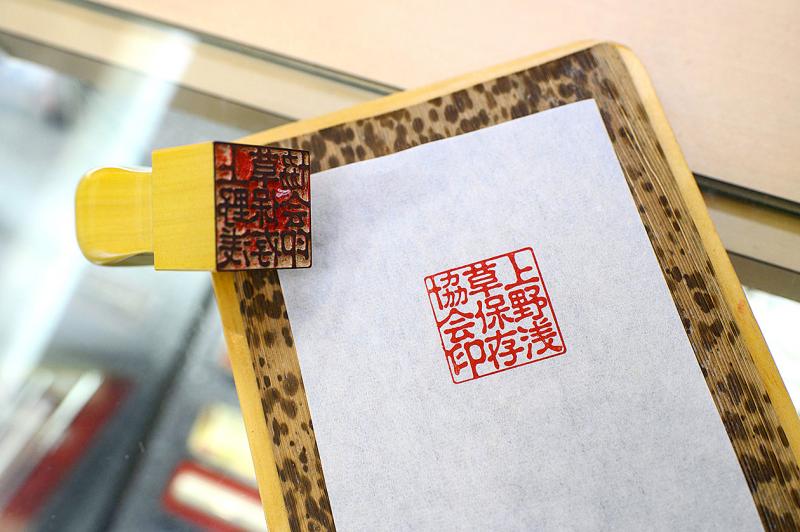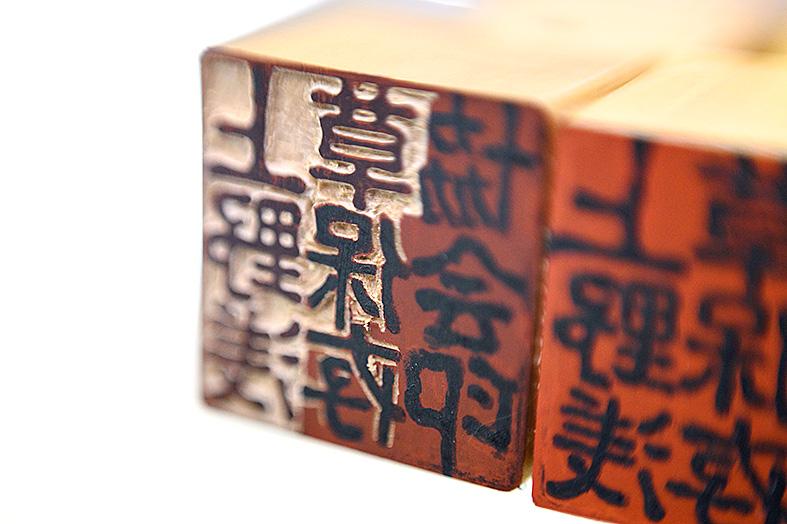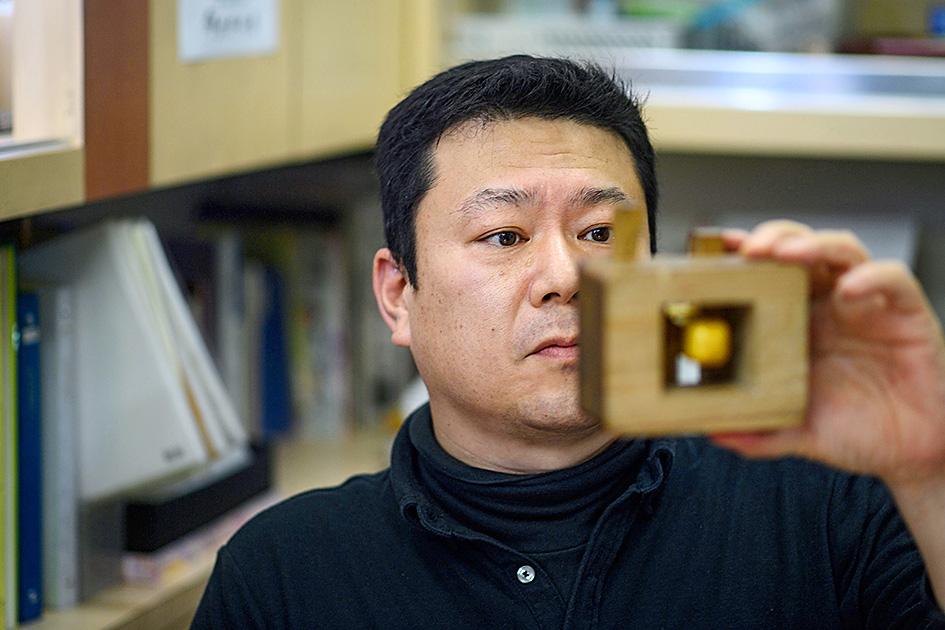Japan’s new prime minister is declaring war, but there’s no danger of an international conflict: the target of his ire is the humble ink stamp known as hanko.
It might seem paradoxical in a country often assumed to be a futuristic tech-savvy paradise, but Japan’s business world and bureaucracy remain heavily dependent on paper documents, hand-stamped with approval.
The drawbacks to hanko, which are used for everything from delivery receipts to marriage certificates have become increasing clear during coronavirus — many Japanese were unable to work from home because they had to physically stamp documents in the office.

Phots: AFP
Now Prime Minister Yoshihide Suga is on a push to digitize the nation, but he faces an uphill struggle when it comes to the stamps, which range from mass-produced plastic ones to hand-carved wooden versions used on special occasions.
Artisan stamp-maker Takahiro Makino, who painstakingly carves miniature characters into each unique piece he makes, isn’t too worried about the drive.
“We shouldn’t keep using things that aren’t necessary. But on the other hand, an object of value will survive no matter what,” he said at his workshop in downtown Tokyo.

Photo: AFP
For each stamp, he carefully paints the name of the person or company that will adorn it, before beginning the delicate work of chiseling.
Each stamp will “carry the personality of each craftsman,” the 44-year-old said.
Sturdy handmade stamps like Makino’s cost several hundred dollars and are often given by parents to children as a coming-of-age gift — an essential tool for a responsible adult.

Photo: AFP
Their unique design is registered at city hall so it can be verified when used to validate property deeds and other important documents.
STAMP IT OUT
For everyday signatures, people use smaller, cheaper mass-produced seals, and the stamps are often a key part of an office worker’s daily grind.
That’s precisely what Suga and his administrative reform minister Taro Kono are keen to stamp out.
“I will insist no seals be required for administrative procedures unless they are justified,” Kono said at a press conference soon after his appointment.
Examples of hanko excess aren’t hard to come by, with Kono himself citing documents reportedly stamped more than 40 times by different officials.
And Japanese residents say the stamps are sometimes even required in digital transactions.
“One time I was asked to stamp a piece of paper, scan it and then attach it to an electricity bill,” laughed Sayuri Wataya, 55, an editor.
The government’s push has borne some fruit, with Japan’s national police agency saying it will stop the mandatory use of the seals for casual document approvals from next year. Big Japanese companies including Hitachi have also vowed to abolish hanko use in internal paperwork.
Observers warn however that streamlining the reams of paperwork that currently swamp Japanese companies and government offices involves deeper-rooted issues.
Japan Research Institute manager Takayuki Watanabe sees the stamps as part of Japan’s hierarchical business culture.
To get a decision approved, an employee often needs stamped approval from colleagues above them in rank, one by one, he said.
“First you need a seal from your superior, then the team leader, the section chief and the department director,” he said. “It’s a no-no to skip those in the middle.”
The top boss usually stamps their seal upright on the left of a document, with lower-ranking employees all tilting their stamps towards it as if “bowing.”
SEAL OF APPROVAL
Having the whole team’s stamps shows a collective decision has been made, Watanabe said.
“It’s like, ‘I stamped my seal to approve it but you did it before me, so you should be held liable,’” explained accountant Tetsuya Katayama.
“No one wants to take responsibility in Japan,” he said.
Watanabe warned that the government’s anti-hanko campaign will founder unless Japanese workers can break out of that mentality.
“Even if they digitize paperwork, they will end up pressing computer buttons as many times (as they stamped),” he said. “People have to steel themselves to take certain responsibility.”
At the All Japan Hanko Industry Association, senior official Keiichi Fukushima is a perhaps unlikely advocate for scaling back stamping.
“People have used hanko stamps just for the sake of stamping,” he concedes.
Insisting they are used only when necessary will clarify when they’re actually needed and “may be a good chance to prove how important the custom of hanko is.”

Nov. 11 to Nov. 17 People may call Taipei a “living hell for pedestrians,” but back in the 1960s and 1970s, citizens were even discouraged from crossing major roads on foot. And there weren’t crosswalks or pedestrian signals at busy intersections. A 1978 editorial in the China Times (中國時報) reflected the government’s car-centric attitude: “Pedestrians too often risk their lives to compete with vehicles over road use instead of using an overpass. If they get hit by a car, who can they blame?” Taipei’s car traffic was growing exponentially during the 1960s, and along with it the frequency of accidents. The policy

While Americans face the upcoming second Donald Trump presidency with bright optimism/existential dread in Taiwan there are also varying opinions on what the impact will be here. Regardless of what one thinks of Trump personally and his first administration, US-Taiwan relations blossomed. Relative to the previous Obama administration, arms sales rocketed from US$14 billion during Obama’s eight years to US$18 billion in four years under Trump. High-profile visits by administration officials, bipartisan Congressional delegations, more and higher-level government-to-government direct contacts were all increased under Trump, setting the stage and example for the Biden administration to follow. However, Trump administration secretary

In mid-1949 George Kennan, the famed geopolitical thinker and analyst, wrote a memorandum on US policy towards Taiwan and Penghu, then known as, respectively, Formosa and the Pescadores. In it he argued that Formosa and Pescadores would be lost to the Chine communists in a few years, or even months, because of the deteriorating situation on the islands, defeating the US goal of keeping them out of Communist Chinese hands. Kennan contended that “the only reasonably sure chance of denying Formosa and the Pescadores to the Communists” would be to remove the current Chinese administration, establish a neutral administration and

A “meta” detective series in which a struggling Asian waiter becomes the unlikely hero of a police procedural-style criminal conspiracy, Interior Chinatown satirizes Hollywood’s stereotypical treatment of minorities — while also nodding to the progress the industry has belatedly made. The new show, out on Disney-owned Hulu next Tuesday, is based on the critically adored novel by US author Charles Yu (游朝凱), who is of Taiwanese descent. Yu’s 2020 bestseller delivered a humorous takedown of racism in US society through the adventures of Willis Wu, a Hollywood extra reduced to playing roles like “Background Oriental Male” but who dreams of one day